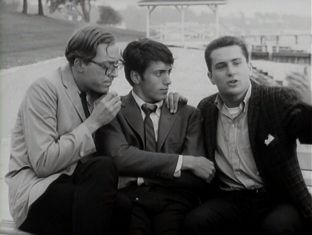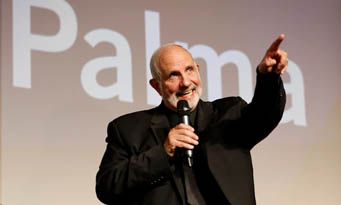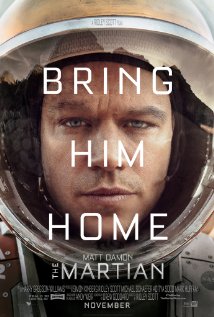VIDEO: DE PALMA & BAUMBACH DISCUSS DTK
ALSO: ARMOND WHITE ON DTK AS "A GAY MOVIE LANDMARK"; CRITERION ESSAY BY MICHAEL KORESKYArmond White, Out"
William Friedkin’s
Cruising, another 1980 film, portrayed gay society through a sleazy serial-killer mystery set in New York’s Bondage-Discipline underworld. (
Al Pacino played a heterosexual cop tantalized by forbidden behavior, neurotically seeing gayness only as a sex-and-death equation). But in
Dressed to Kill, De Palma dramatized cruising as part of social life — the sexual license that even middle-class heterosexuals enjoyed. De Palma’s sophomoric lustiness derived from his earliest film burlesques (
The Wedding Party, Greetings, Hi, Mom!, Sisters, Phantom of the Paradise) where counterculture ideas confounded the mainstream.
"For his first, truly adult film about sex, De Palma’s perspective matures in Dressed to Kill. Kate’s manhunt, set in the Metropolitan Museum of Art, equaled the jailhouse symbolism of Jean Genet-Jean Cocteau’s Un Chant d’Amour (1950). It also explored the same existential territory seen in a breed of underground New York porn films like Sam Scott’s Non-Stop (where seemingly spontaneous, peripatetic episodes ranged from rendezvous at Manhattan’s West Side piers to street assignations in Greenwich Village). De Palma outclasses porn, but his artistic connection to Surrealist filmmakers from Hitchcock to Cocteau to Bunuel proves he was unafraid to depict subconscious, even outré, desires.
"Kate’s bored gallery browsing is depicted when she stares back at an Alex Katz portrait that mirrors her own impatience. Her sexual frustration is caricatured when she observes a painting of a gorilla whose oversized, hairy, supine nakedness mocks her own, suppressed, animal instincts. She abstractly writes in her memo pad, 'Pick up turkey.' (Come now, Brian!)
"It’s all prelude to her noticing the handsome man wearing sunglasses who invades her space and stirs her curiosity. Their cat-and-mouse politesse (a game of high-class silent flirtation) deepens Kate’s interest which De Palma sensualizes by having the camera follow them in slowly flowing perambulations through museum exhibit space. This silent sequence (except for Pino Donaggio’s tense, teasing music score) is a long, masterful pantomime, delicately acted by Dickinson. The desperation and feints of cruising are clearly presented in details so timeless that the sexual hunt is immortalized (including Kate feeling wanton and exposed as she stands before one of Eric Fischl’s satirical nudes)."
Michael Koresky's essay for the Criterion edition of Dressed To Kill
"De Palma the political filmmaker might seem at odds with De Palma the teasing sex-horror specialist, but these two halves of his split personality have worked in tandem throughout his career, and certainly do so in Dressed to Kill. This film is a minefield of potential offense—with its horrific butchery of a middle-aged woman and its full-frontal images of naked women shot like soft-core pornography—and, especially at a moment when studio output like Kramer vs. Kramer and Looking for Mr. Goodbar was being accused of containing reactionary responses to second-wave feminism (respectively, for demonizing a woman for abandoning her marriage and child and, like Dressed to Kill, depicting the murder of a woman trying to liberate herself through sex), it was bound to incite some anger. Indeed, feminist groups publicly protested Dressed to Kill, creating a perception of it as misogynistic. Yet the film is far more sympathetic to its women than its men, and more important, its recognition of its own voyeur-horror lineage, its ratcheting up of nearly every element—from the nudity to the graphic bloodletting to the extravagant camera work to the often absurdly drawn-out slow motion—to orgiastic heights, places the sadistic impulses of Hitchcock’s work (so, the Movies) explosively at the forefront. It’s both ghastly and erotic, impeccably crafted and dirty-minded, a luxurious wallow in the dream and nightmare that is cinema.
"Kate’s explicit shower reverie at the beginning is our first clue to the way De Palma is playing with Psycho’s indelible imagery in Dressed to Kill. The camera slowly peeks around a corner and flaunts in lewd close-up her naked breasts and genitals (aptly, actually those of a body double: Victoria Lynn Johnson, direct from the pages of Penthouse). What had once been impossible was, in 1980, not only permissible but also marketable; this is the true titillation, the dark heart of Psycho laid literally bare. The fact that the film ends with a second shower scene—also imaginary—underlines its relationship to Hitchcock as a game of surreal one-upmanship.
"In this and all the entries in De Palma’s grand project of showing us Hitchcock’s thrillers stripped of pretense and elegance—so that, for example, Vertigo becomes Obsession (1976), the double of the protagonist’s dead wife revealed to be his daughter; and Body Double (1984) brazenly combines Rear Window and Vertigo into a tawdry peep show, set in the underworld of Los Angeles porn—we can see De Palma the thrill hound and the confrontational artist. Janet Leigh’s cinema-shattering shower seems to be a primal scene for him, something he needs to return to over and over. His oeuvre is soaked with shower scenes, as parody (Phantom of the Paradise, 1974), locker-room fantasy (Carrie), tragedy (Blow Out, 1981), and travesty (Body Double). (Even 1983’s Scarface has one, a chain-saw massacre visited on the protagonist’s male friend—which our antihero is forced to watch.)
"Shower scenes, with their combination of sensuality and danger, are particularly right for a film as fueled by hallucinatory erotic energy as this one. De Palma himself says he was actually more influenced by Luis Buñuel than Hitchcock when making Dressed to Kill (and there’s certainly a touch of Belle de jour in the opening masochistic daydream). Its central murder is an event that occurs at the convergence of two characters’ sexual fantasies: Kate’s and her killer’s."
 Thanks to Hugh for letting us know that Tom Wolfe will speak following a screening of The Bonfire Of The Vanities, Brian De Palma's film adaptation of Wolfe's most famous novel. The event will take place at 7pm October 27th, at 92nd Street Y in New York City. The screening is part of the 10th Annual Forum on Law, Culture & Society Film Festival, which presents "films that illuminate the moral dilemmas and dramatic moments of the legal system."
Thanks to Hugh for letting us know that Tom Wolfe will speak following a screening of The Bonfire Of The Vanities, Brian De Palma's film adaptation of Wolfe's most famous novel. The event will take place at 7pm October 27th, at 92nd Street Y in New York City. The screening is part of the 10th Annual Forum on Law, Culture & Society Film Festival, which presents "films that illuminate the moral dilemmas and dramatic moments of the legal system."



 Robert De Niro has been out promoting his new film, a Nancy Meyers comedy called The Intern.
Robert De Niro has been out promoting his new film, a Nancy Meyers comedy called The Intern.  Here are some more interviews and reviews of De Palma from the Venice Film Festival last week:
Here are some more interviews and reviews of De Palma from the Venice Film Festival last week: A couple of Mission To Mars-related items, beginning with
A couple of Mission To Mars-related items, beginning with  Here are some more links to reviews and articles centered around De Palma:
Here are some more links to reviews and articles centered around De Palma:








